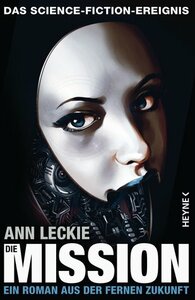You need to sign in or sign up before continuing.
Take a photo of a barcode or cover
Plot or Character Driven:
Plot
adventurous
mysterious
tense
medium-paced
Ancillary Sword presents a total tonal shift from the previous book, Ancillary Justice.
Arguably, one could hardly identify this book as a continuation of the series at all. It much rather reads as a novella, following the adventures of Breq on the new system of Athoek, making friends and uncovering corruption, whilst dealing with the trauma and grief of losing herself and her loved one.
There is no plot continuation whatsoever, only vibes - which is why, despite it being a lukewarm second book, I loved Ancillary Sword nonetheless (as it very much feels like a Murderbot entry, whom I love and cherish and worship).
Still, this leaves me very curious of what the next and final novel will bring to the table, seeing as none of the conflict that has been brought up in book one has been resolved, but rather new questions have arisen.
Arguably, one could hardly identify this book as a continuation of the series at all. It much rather reads as a novella, following the adventures of Breq on the new system of Athoek, making friends and uncovering corruption, whilst dealing with the trauma and grief of losing herself and her loved one.
There is no plot continuation whatsoever, only vibes - which is why, despite it being a lukewarm second book, I loved Ancillary Sword nonetheless (as it very much feels like a Murderbot entry, whom I love and cherish and worship).
Still, this leaves me very curious of what the next and final novel will bring to the table, seeing as none of the conflict that has been brought up in book one has been resolved, but rather new questions have arisen.
Si en la primera novela, imprescindible para leer ésta, la trama estaba centrada en un par de personajes sobre el comienzo de una crisis imperial interpretaría, ahora el elenco de personajes se ha multiplicado pero los escenarios se han reducido. Apenas se visitan una nave, una estación y una región de un planeta. Depende de lo que más te guste o valores de una "space opera" puede que este libro te guste más o no se encuentre a la altura.
Me ha gustado muchísimo poder conocer más sobre la forma de pensar de la protagonista y cómo su particular origen y trasfondo influye en la visión que tiene y crítica sobre aspectos como el racismo y el colonialismo. Y cómo ha elaborado varios personajes orbitando alrededor muy bien elaborados y complejos.
Para ser una trilogía no consigo ver cómo todo lo que ha sucedido en esta segunda novela de la saga aporta o influye en el gran arco argumental, porque da la sensación de que se ha centrado en problemas locales de una región específica del imperio. Puede que simplemente quisiera profundizar en algunos asuntos que forman parte del mal endémico y responsables del colapso del imperio como tal, pero hasta que no termine la trilogía me ha dejado insastifecho.
Me ha gustado muchísimo poder conocer más sobre la forma de pensar de la protagonista y cómo su particular origen y trasfondo influye en la visión que tiene y crítica sobre aspectos como el racismo y el colonialismo. Y cómo ha elaborado varios personajes orbitando alrededor muy bien elaborados y complejos.
Para ser una trilogía no consigo ver cómo todo lo que ha sucedido en esta segunda novela de la saga aporta o influye en el gran arco argumental, porque da la sensación de que se ha centrado en problemas locales de una región específica del imperio. Puede que simplemente quisiera profundizar en algunos asuntos que forman parte del mal endémico y responsables del colapso del imperio como tal, pero hasta que no termine la trilogía me ha dejado insastifecho.
Breq really is the best captain. Cold, calm, and brilliantly calculating, she's at her best when pitting her wits against other machines or people who think they know what they are dealing with. This installment starts of excellent, drags a little in the middle before getting better, and then just sort of ends. It's a little bit directionless-Breq's driving goal from the first book is getting farther and farther away, and the other goings on are really small potatoes. That said, it still gets four stars because it's still a brilliant read. Leckie doesn't write action well so it's a fine thing that most of the book is either dialogue or Breq's omnipresent data stream-often both at once. It's a testament to what the author and her little AI can do that not much really happens in this book but it's still fascinating, and I love Breq despite her cool Spockness-or more likely, because of it. I can't wait for the next one.
does the fact that this series reminds me somehow (in an absolutely inexplicable way) of his majesty’s dragon make me insane……. Anyways I love Ann Leckie and I’m gonna need you guys to read this series YESTERDAY!
Again, somehow didn't review this when I read it originally, so let's fix this now. :) Was thinking back as I was reading this book, and I think this is one of the first books I read where lesbian relationships were treated as a matter of fact, and to point out the weirdness of gender perceptions within society. We also get more of the politics of who is and isn't considered "people" within the confines of empire, especially in a relatively small plot point that ends up taking unexpected importance. While there's a lot going on in this book in terms of the larger plot, it also isn't afraid to let what might've been a side plot in another book take precedence for most of it. The varying scales of scope, the setup for the next book and continuance of plot points from the original book, and just all of this in general hit in just the right way. Still The Good Shit, almost a half decade plus on.
Spoiler
I really like the premise, characters, and style of the Ancillary series thus far, but found this book a little shallow. The major plotline from Ancillary Justice, the division of Anaander Minaai's personality into warring factions, is largely tabled as Breq addresses problems on the much smaller scope of a single planet. Unfortunately, the conflict that Breq encounters is cookie-cutter social injustice in the form of a feudal system of conquerors oppressing the conquered, and Breq's responses are similarly bland. The central conflict of Breq's exemplar morality versus Raughd's depraved selfishness plays out with little inspiration: Raughd commits incrementally more immoral crimes, until Breq intervenes with her power as Fleet Commander. As another reviewer put it, the story feels like a drawing by an artist who only got the primary color crayon box. The connection to the larger scope of the galactic conflict is tenuous, with Breq picking up a few clues on the planet which drive the sudden spate of action that concludes the novel.It's easy to be disappointed by the reduction in scope from Justice to Sword: from the collapse of an empire to the conflict between conquerors and conquered on a single planet. Nonetheless, of course, many a great novel has been set on a single planet. The turn-off for me was the lack of nuance in presentation.




